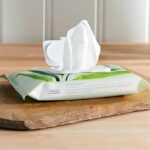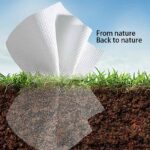
Industry figures show that over 70 per cent of consumer wet wipes on sale in the United Kingdom are already plastic free.
Non-flushable wet wipes are found in sewer blockages, but they are not the primary cause of them, EDANA, an association of the non-wovens and related industries, has said reacting to a consultation published by the UK government on a proposal to ban plastic in some wet wipes.
The primary cause is fats, oil and grease being incorrectly poured down the drain.
Scientific research shows that the primary cause of sewer blockages is fats, oil and grease (FOG) being incorrectly poured down the drain by both businesses and consumers, she said.
This results in a build-up of FOG causing fatbergs, which then catch other items that should not have been flushed and should never have ended up in the sewers – including wet wipes, menstrual health products, nappies, cotton buds, incontinence pads, tea towels, and more – which ultimately leads to sewer blockages.
There is a need for educational campaigns that stop FOG being poured down the drain and to stop unflushable wet wipes being wrongly flushed by consumers, she suggested.
Therefore, taking plastic out of consumer wet wipes cannot alone solve the problem of sewer blockages, she noted.
Plastic can be vital in ensuring disinfectant, anti-viral and hygiene functions in certain wet wipes. These properties are a requirement for wipes by the NHS as well as other medical, social, care and other professional and industrial settings.
These are institutional and industrial settings where waste regulations and guidance already exist and are followed by staff to ensure that these wipes are properly disposed of in appropriate bins and waste facilities. As such they are extremely unlikely to be incorrectly flushed, EDANA noted.
EDANA called for mandatory ‘Do Not Flush’ labelling for non-flushable wipes using one of the two existing widely recognised logos to make it very apparent to consumers.
For consumers to be able to continue to benefit from plastic free wet wipes, natural polymers like viscose and lyocell, which are made from plants usually trees, must be able to continue to be used, EDANA said. Other than plastic, there are no other polymers that can be used to create wet wipes.
The industry should be offered sufficient time to adapt to cent per cent plastic-free alternatives for consumer wet wipes, as well as to sell existing wet wipes stocks to avoid the unnecessary waste and environmental impact if unsold items need to be destroyed as they no longer comply with regulations, EDANA suggested.
Any proposed restrictions on plastic in consumer wet wipes must be introduced at the same time and in the same manner across the whole of the United Kingdom.
An England only approach either to regulation or the timing of implementation would lead to a situation where English manufacturers cannot sell consumer plastic containing wet wipes in England, but Scottish and Welsh manufacturers can.
It is perfectly possible to adopt a UK wide approach to both regulation and implementation and that is a far better approach for all stakeholders, it added.










